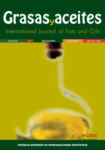
GRASAS Y ACEITES
metrics 2024
Bridging research and application in food science.
Introduction
GRASAS Y ACEITES, published by the Consejo Superior Investigaciones Científicas (CSIC)Food Science and Organic Chemistry since 1991. Based in Madrid, Spain, this journal facilitates the dissemination of innovative research and cutting-edge discoveries pertaining to fats and oils, addressing both their nutritional properties and functional applications. The journal holds a commendable position within the academic community, ranking in the third quartile in both its categories as of 2023, and features a dedicated platform for dialogue among researchers, professionals, and students. By providing unhindered access to its publications, GRASAS Y ACEITES fosters a collaborative environment for advancing knowledge and understanding in its respective fields, making it an essential resource for those invested in food science and organic chemical research.
Metrics 2024
 0.28
0.28 1.00
1.00 1.40
1.40 56
56Metrics History
Rank 2024
Scopus
IF (Web Of Science)
JCI (Web Of Science)
Quartile History
Similar Journals

Acta Scientiarum Polonorum-Technologia Alimentaria
Bridging Research and Practice in Food SafetyActa Scientiarum Polonorum-Technologia Alimentaria, published by Poznan University of Life Sciences, is a revered journal in the field of food science, showcasing cutting-edge research and innovations in food technology. Established as a leading platform within its domain, this journal is indexed under Scopus and ranks in the 2023 Q3 quartile for Food Science, demonstrating its commitment to high-quality scholarship. With an ISSN of 1644-0730 and E-ISSN 1898-9594, it serves as a critical resource for researchers, professionals, and students seeking to stay at the forefront of advancements in food safety, quality control, and sustainable practices. The journal has also been recognized for its contributions to the agricultural and biological sciences, positioning itself at rank #205 out of 389 in this competitive field. While currently not offering open access, the journal's valuable insights and findings, especially as it publishes through 2024, play a crucial role in advancing knowledge and fostering collaboration among experts in the food science sector.
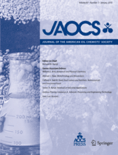
JOURNAL OF THE AMERICAN OIL CHEMISTS SOCIETY
Unveiling Breakthroughs in Chemical ScienceJOURNAL OF THE AMERICAN OIL CHEMISTS SOCIETY, published by WILEY, is a premier academic journal that has been at the forefront of research in the fields of chemical engineering and organic chemistry since its inception in 1947. With an ISSN of 0003-021X and an E-ISSN of 1558-9331, this journal serves as an invaluable resource for researchers and professionals interested in the latest advancements and methodologies in oil chemistry and related disciplines. The journal holds impressive rankings, placing in the Q2 category for Chemical Engineering and Q3 for Organic Chemistry, reflecting its influential position in the academic community as evidenced by its Scopus rankings. While it follows a subscription model, the journal remains committed to disseminating quality research, aiming to enhance understanding and application within the chemical science sector. Researchers, professionals, and students engaged in oil chemistry and engineering will find JOURNAL OF THE AMERICAN OIL CHEMISTS SOCIETY crucial for staying abreast of developments that shape this dynamic field, as it continues to publish cutting-edge research through to 2024 and beyond.

ACS Food Science & Technology
Pioneering Research for Tomorrow's Food ChallengesACS Food Science & Technology is a premier peer-reviewed journal published by the American Chemical Society (ACS) that addresses the dynamic intersections of food science, chemistry, and technology. With its E-ISSN: 2692-1944, this journal aims to disseminate innovative research and comprehensive reviews that enhance understanding in fields such as analytical chemistry, organic chemistry, and general food science. Despite the absence of an Open Access model, its position in the Q2 quartile for multiple categories in 2023 underscores its significant impact on the scholarly landscape, ensuring researchers can access high-quality research pertinent to today's food challenges. With an expanding timeline of 2021 to 2024, ACS Food Science & Technology is poised to be an essential resource for advancing the scientific community's knowledge, fostering collaboration, and bridging gaps between academia and industry.
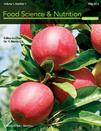
Food Science & Nutrition
Empowering research for sustainable food and nutrition solutions.Food Science & Nutrition is an esteemed peer-reviewed journal published by WILEY, dedicated to advancing the fields of food science and nutritional research. With an impressive impact factor and a prestigious Q1 ranking in the Food Science category, this journal stands out as a leading platform for innovative research, offering meaningful insights into the relationship between food composition and health outcomes. Since its transition to Open Access in 2013, Food Science & Nutrition has championed the global dissemination of knowledge, ensuring that vital research is accessible to researchers, professionals, and students alike. With a vast scope that encompasses both agricultural and biological sciences, the journal provides a comprehensive view of emerging trends, methodologies, and applications in food security and nutrition, making it indispensable for those invested in these critical areas.
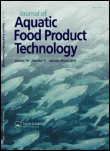
Journal of Aquatic Food Product Technology
Advancing aquatic innovation for a sustainable future.Journal of Aquatic Food Product Technology is a vital publication dedicated to advancing research and innovation in the fields of aquatic science and food technology. Established in 1992 and published by TAYLOR & FRANCIS INC, this journal provides an exceptional platform for researchers, professionals, and students to share their findings and insights on the science and technology surrounding aquatic food products. With an ISSN of 1049-8850 and an E-ISSN of 1547-0636, the journal caters to a global audience, contributing to significant advancements in both the agricultural and biological sciences. As of 2023, it holds a prestigious position in the Q3 quartile for both Aquatic Science and Food Science categories, reflecting its role in the scientific community. Furthermore, with Scopus rankings placing it at #106 out of 247 in its field, this journal is an essential resource for those dedicated to understanding and innovating in the domain of aquatic food products. Although not an open access journal, it ensures that the important research it publishes is accessible to a wide audience interested in improving food safety, sustainability, and nutrition from aquatic sources.
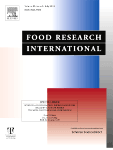
FOOD RESEARCH INTERNATIONAL
Elevating Standards in Food Science ResearchFOOD RESEARCH INTERNATIONAL is a premier academic journal published by ELSEVIER, specializing in the field of Food Science. With an impressive impact factor and ranked Q1 in the 2023 category quartiles, it stands at the forefront of research, positioned 17th out of 389 in the Scopus ranking for Agricultural and Biological Sciences, attaining a commendable 95th percentile. The journal publishes high-quality, peer-reviewed articles that cover a broad spectrum of topics, including food safety, quality control, nutrition, and biotechnology, making it an invaluable resource for academics, industry professionals, and students alike. As FOOD RESEARCH INTERNATIONAL seeks to enhance understanding and advance technologies related to food, it encourages innovative perspectives and interdisciplinary research. The journal, active from 1992 and continuing through 2024, is an essential platform for disseminating vital findings and fostering collaboration within the global food science community.

Food Chemistry-X
Advancing the Science of Flavor and Safety.Food Chemistry-X is a premier open-access journal published by Elsevier, dedicated to advancing the field of food chemistry through high-quality research and comprehensive reviews. With its ISSN of 2590-1575, the journal has gained significant attention since adopting an open-access model in 2019, allowing wide dissemination of knowledge and innovations in food science. Based in the United Kingdom, it holds prestigious Q1 rankings in both Analytical Chemistry and Food Science categories as of 2023, positioning itself as a leading platform for researchers worldwide. The journal's focus spans extensive topics within food chemistry, including food safety, nutritional analysis, and the chemical properties of food, offering insights that are crucial for addressing contemporary challenges in food production and consumption. With a Scopus rank placing it in the 65th percentile among the top journals in Food Science and the 58th percentile in Analytical Chemistry, Food Chemistry-X is an essential resource for academics, professionals, and students seeking to stay at the forefront of research and innovation in this vibrant field.
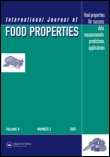
INTERNATIONAL JOURNAL OF FOOD PROPERTIES
Transforming food science through open access research.INTERNATIONAL JOURNAL OF FOOD PROPERTIES, published by TAYLOR & FRANCIS INC, is a leading platform for disseminating high-quality research in the field of food science. With an ISSN of 1094-2912 and E-ISSN of 1532-2386, this journal has been committed to open access since 2018, ensuring that groundbreaking studies are readily available to global audiences. The journal has steadily gained recognition for its contribution to the discipline, achieving a Q2 ranking in Food Science and placing in the 68th percentile among its peers according to Scopus metrics. Covering a wide array of topics related to the properties and applications of food, it serves as a valuable resource for researchers, professionals, and students alike. With coverage extending from 1998 to 2024, the journal continually seeks to advance knowledge and foster innovation within the food science community, making it a pivotal publication for anyone serious about this vital field.
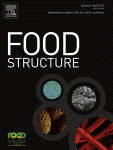
Food Structure-Netherlands
Charting New Territories in Food BiotechnologyFood Structure-Netherlands, published by Elsevier, stands at the forefront of research in the fields of Applied Microbiology and Biotechnology, Bioengineering, and Food Science. With its ISSN 2213-3291 and a commendable position in the 2023 Q1 category rankings, this journal serves as a vital platform for scholars and professionals seeking to explore the innovative intersections of food structure and its multifaceted applications. The journal has garnered significant recognition, ranking 67th in Food Science and 36th in Applied Microbiology and Biotechnology, placing it in the top echelons of its field with 82nd and 72nd percentiles, respectively. Spanning years from 2014 to 2024, Food Structure-Netherlands aims to disseminate high-quality research that fosters the advancement of knowledge, promoting sustainable practices and technological innovations in the food industry. Researchers, professionals, and students will find this journal to be an invaluable resource for cutting-edge studies and emerging trends in food structure and functionality.

FOOD TECHNOLOGY AND BIOTECHNOLOGY
Empowering Researchers to Shape the Future of FoodFOOD TECHNOLOGY AND BIOTECHNOLOGY is a distinguished peer-reviewed journal published by the Faculty of Food Technology and Biotechnology, University of Zagreb, Croatia. Since its inception in 1993, this Open Access journal has become a crucial platform for disseminating innovative research in the fields of food science, biotechnology, and chemical engineering. With a commendable impact factor and consistent Q2 and Q3 rankings across multiple categories—including Biotechnology, Food Science, and Industrial Engineering—this journal not only fosters academic discussions but also addresses real-world challenges in food production, safety, and sustainability. As it converges its thematic scope from 1996 to 2024, FOOD TECHNOLOGY AND BIOTECHNOLOGY remains committed to advancing knowledge through high-quality research and interdisciplinary collaboration, making it an essential resource for researchers, professionals, and students seeking to stay at the forefront of food innovation and biotechnology.